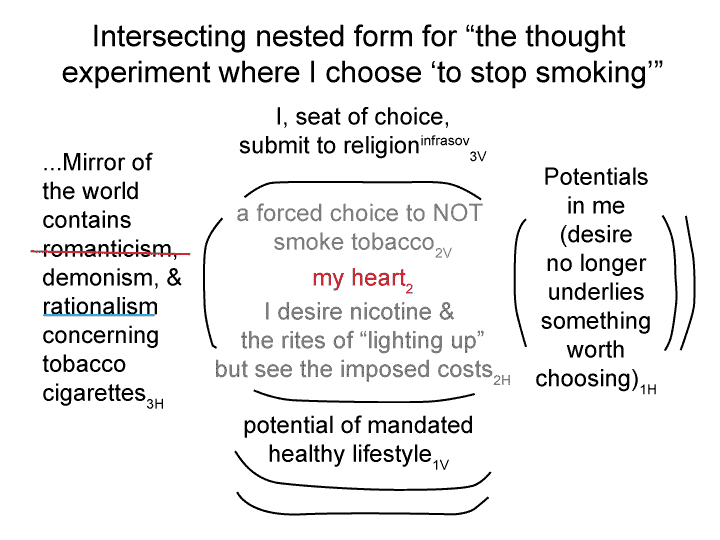Category Archives: Defining Religion
Man and Sin by Piet Schoonenberg (1964) 2.3 NZ
[Given the market interferences by the religioninfrasov, the smoker adjusts to the unromantic image of me being forced to pay attention to a healthy lifestyle and betraying my old buddies.
Indeed, the demonization of the smoker initiates repetitive sequences of negative thoughts, initiating the very thought-pattern that lighting up so effectively breaks.
Thus, ‘giving up smoking’ carries the emotional baggage of a forced religious conversion.
Progressive facets of the mirror of the world burn with merciless and demonic sovereign power.]
Man and Sin by Piet Schoonenberg (1964) 2.3 NY
Summary of text [comment] page 83
[… or, I should say, malfunctions, since it contains several normal contexts that are mutually exclusive.
If a person smokes, in order to quit, that person needs to give up the romantic image of me engaging in a relaxation ritual along with friends and fellow travelers (from phase one).
One facet of the normal context of the mirror of the world has to be erased.]
Man and Sin by Piet Schoonenberg (1964) 2.3 NX
[The demonization of smokers and tobacco companies, plus detailed explanations of the long-term health risks enters into the interscope of the smoker as part of the mirror of the world3a.
As long as sensible construction prevails this interscope functioned …]
Man and Sin by Piet Schoonenberg (1964) 2.3 NW
[The late-20th century campaign against evil tobacco is an example of a religioninfrasov.
Smoking and tobacco products become anti-objects.
Progressive crusaders are pro-object.
American states gain a rationale for regulating sales and imposing taxes on tobacco cigarettes.
The central government sues the tobacco companies for health costs and wins. Millions of dollars are siphoned to pay legal fees. Further legislation regulates the sale and use of tobacco products.]
Man and Sin by Piet Schoonenberg (1964) 2.3 NV
[In phase three, health concerns provide cover for Progressive crusaders, who are always on the lookout for a new organizational object to propose.
The organizational objective of a healthy lifestyle allows thinkgroups to call for the use of sovereign power to put and end to smoking tobacco.
In phase three, valuehealth1b conflicts with desiresmoker1a.]
Man and Sin by Piet Schoonenberg (1964) 2.3 NU
[In phase two, physicians, friends and loved ones of smokers notice the chronic health problems of habituated smokers.
Another value (health) enters the picture.]
Man and Sin by Piet Schoonenberg (1964) 2.3 NT
[The history of tobacco products may be told as three phases.
In phase one, tobacco cigarettes are romanticized.
Before cigarettes became popular (mass produced), they are regarded as a form of relaxation and thus a benefit to health.
After all, smoking a cigarette is like a ritual.
So, the health benefits of a cigarette are linked to a relaxation ritual.
The original concept goes like this:
A little tobacco (in fact, very little, since tobacco is toxic in high doses) plus a ritual equals relaxation. This short-term relaxation benefits the anxiety prone individual. Lighting up allows the smoker to take a break.
In phase one, value1b aligns with desire1a.]
Man and Sin by Piet Schoonenberg (1964) 2.3 NS
Summary of text [comment] page 83
[I now want to examine ‘the thought experiment where ‘I choose to smoke a tobacco cigarette’’.
Let me start with an off-the-cuff history.]
Man and Sin by Piet Schoonenberg (1964) 2.3 NR
[How does sovereigninfra ban tobacco cigarettes?
Regulation and taxation increase the cost of tobacco cigarettes.
Smoking is banned in particular locations.
And so on.
Some Progressive law firms make lots of money by suing the tobacco companies for elevated health costs from tobacco-related illnesses.
Progressives also raise the cost of the research and development of substitutes for tobacco cigarettes.
Today’s substitutes, available in niche markets, were developed outside the United States of America.]

